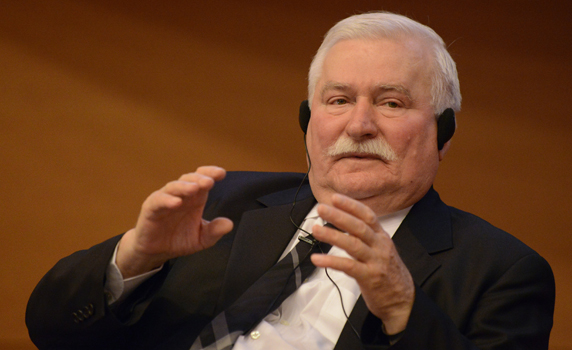
“If we dismantle the European Union today, we would have to begin reintegration tomorrow.” It was with this conviction of the need for a united Europe that the former Polish president and Nobel Peace Prize winner Lech Walesa opened the inaugural conference of the Fast Forward program.
While he recognized that not everything in the current system works well, he said that “we don’t need revolutions, only some corrective measures.” He himself was a revolutionary once when he founded the Solidarity union, which opened a breach in the communist system, which in turn led to the fall of the Iron Curtain.
It is possible to change the status quo
According to Walesa, everyone said there was no hope of changing the status quo and that “only a nuclear war could defeat the communist regime.” But the electrician and accidental union leader did not agree.
Born into a Poland that was oppressed by the communist regime and constantly threatened by Russian and German expansionism, he could have sat on his hands. But he decided to lead and fight in his own way, as head of Solidarity, the first independent trade union in the Eastern Bloc.
He was in the front line of the bloody repression of the strikes called against the regime by the Gdansk shipyard workers and spent a year in prison for having organized their defense.
Now 71, he is proud of his country, which is celebrating 25 years of democracy, integration into the European Union and has its own voice in NATO.
“We have to look to the past. They said it was impossible to defeat communism but we did it. Nothing is impossible,” he said enthusiastically.
Commitment to build something new
Asked about the success at fighting and defeating communism, he said he would have preferred to have had success in building something, in creating a new order. He encouraged young people to commit themselves, to participate in this globalized and connected world, which he sees as a unique opportunity to establish something new from a broader perspective and for the common good.
“Young people need to be aware of and appreciate this world without frontiers in which we live.” At this point, he recalled with fondness and irony his father, who died during World War II. “He wouldn’t have believed that today there would be no borders in Europe, nor soldiers guarding the frontiers of Poland and Germany. That would have given him another heart attack,” he joked.
Lack of moral leadership
During his talk, Walesa highlighted the figure of Pope John Paul II, a Pole himself and also a key figure in the fall of the Polish communist regime. He recalled his moral and spiritual leadership, which he said was lacking in today’s leaders. “There isn’t a single moral or political leader in the world and this is a very dangerous situation.”
Walesa also talked about other leaders whom he had met and who had made an impression on him. He praised in particular the role played by U.S. presidents Ronald Reagan and George Bush. On the other hand, he criticized Vladimir Putin for his role in the conflict in Ukraine, and also Barack Obama, reproaching him for not exercising the sort of world leadership that is expected of a superpower such as the United States.